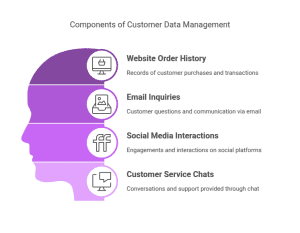Running a successful e-commerce business requires more than just having an online store. To grow and maintain customer loyalty, you need to provide personalized experiences, manage customer interactions efficiently, and streamline sales processes. This is where Customer Relationship Management (CRM) integration becomes a game-changer.
A CRM system helps e-commerce businesses store and analyze customer data, track sales, automate marketing, and improve customer service. When integrated with your e-commerce platform, it provides a seamless customer experience and boosts business efficiency.
In this article, we explore why CRM integration is crucial for e-commerce websites and how it can transform your online business.
1. Centralized Customer Data for Better Insights
One of the biggest challenges in e-commerce is managing scattered customer data. Without a CRM, customer information is often spread across multiple platforms such as:
- Website order history
- Email inquiries
- Social media interactions
- Customer service chats
CRM integration centralizes all customer data, giving you a 360-degree view of each customer. With all data in one place, you can:
- Track customer interactions across multiple touchpoints.
- Understand buying behavior and preferences.
- Segment customers based on purchase history and engagement.
This helps you create targeted marketing campaigns and improve customer experiences, leading to increased sales.

2. Improved Customer Engagement and Retention
E-commerce businesses thrive on repeat customers. However, without a proper system, it’s difficult to engage customers effectively and keep them coming back.
With CRM integration, you can:
- Automate personalized emails based on past purchases (e.g., product recommendations, discount offers).
- Send reminders about abandoned carts to encourage checkout completion.
- Offer loyalty rewards to frequent shoppers.
- Personalize customer interactions by addressing them by name and referring to past purchases.
By making each customer feel valued, CRM integration helps increase brand loyalty and lifetime customer value.
3. Streamlined Order and Sales Management
A CRM system integrated with your e-commerce store allows you to track and manage orders efficiently. Instead of manually updating sales records, CRM software automatically:
- Logs each order and updates customer profiles.
- Tracks purchase frequency and order value.
- Identifies high-value customers and potential leads.
This ensures that sales data is always accurate and up-to-date, reducing errors and improving overall efficiency.
4. Enhanced Customer Support and Faster Issue Resolution
Providing excellent customer service is critical for any e-commerce business. A CRM system helps you track customer inquiries and complaints across multiple channels, including:
- Live chat
- Email support
- Social media messages
- Phone calls
With CRM integration, your customer support team can:
- Access customer history instantly to resolve issues faster.
- Prioritize support tickets based on urgency.
- Automate responses for frequently asked questions.
- Monitor service quality through customer feedback and reviews.
A streamlined support system reduces response times, improving customer satisfaction and brand reputation.
5. Data-Driven Marketing for Higher Conversions
E-commerce businesses that rely on guesswork marketing often waste resources on ineffective campaigns. CRM integration provides real-time customer data, allowing you to launch highly targeted marketing campaigns.
With CRM-powered marketing automation, you can:
- Segment customers based on demographics, behavior, and past purchases.
- Send personalized product recommendations via email or SMS.
- Run retargeting ads to bring back customers who visited your store but didn’t buy.
- Measure campaign performance using CRM analytics to optimize future marketing efforts.
By leveraging CRM data, you increase engagement, improve conversion rates, and maximize return on investment (ROI).
6. Automation of Repetitive Tasks
Manually handling customer relationships and marketing can be overwhelming, especially as your business grows. CRM integration allows you to automate repetitive tasks, such as:
- Follow-up emails after a purchase.
- Cart abandonment reminders to recover lost sales.
- Birthday and anniversary discounts for loyal customers.
- Re-engagement emails for inactive customers.
Automation saves time, reduces human error, and ensures a consistent customer experience.
7. Seamless Multi-Channel Selling
Most e-commerce businesses sell products across multiple platforms, including:
- Their own website
- Social media stores (Facebook, Instagram)
- Marketplaces like Jumia, Kilimall, or Amazon
Managing sales across multiple platforms can be chaotic. CRM integration helps you synchronize customer data across all sales channels, ensuring that:
- Customer purchase history is updated in real time.
- Inventory levels remain consistent across platforms.
- Customer interactions across different channels are tracked in one place.
This results in a smooth shopping experience and helps you avoid overselling or miscommunication.
8. Better Inventory and Supply Chain Management
An integrated CRM doesn’t just track customer interactions—it also helps manage your inventory and supply chain more effectively.
- Predict demand based on past sales trends.
- Avoid stockouts by setting automatic restocking alerts.
- Improve supplier communication with a centralized database.
By ensuring you have the right products in stock at the right time, you reduce lost sales and improve operational efficiency.
9. Boosts Business Growth and Scalability
As your e-commerce business grows, so does the complexity of managing customer relationships. A CRM system ensures your business remains organized, data-driven, and scalable.
With an integrated CRM, you can:
- Expand into new markets with confidence.
- Handle larger volumes of customer inquiries without compromising service quality.
- Scale marketing efforts using data-backed strategies.
A well-implemented CRM system lays the foundation for long-term business success.
Conclusion
CRM integration is no longer a luxury for e-commerce businesses—it’s a necessity. By centralizing customer data, automating marketing, improving customer support, and enhancing sales management, a CRM system helps you create a seamless shopping experience that keeps customers coming back.
At Techrahisi, we help e-commerce businesses integrate powerful CRM solutions that enhance efficiency and drive sales. If you want to take your online store to the next level, let’s work together!
📞 Call us: +254726572527
📧 Email: developers@techrahisi.co.ke
🌍 Visit: techrahisi.co.ke





















